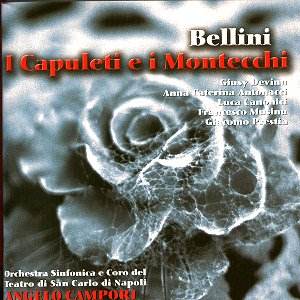This opera should be sub-titled 'The Environmentally
Friendly Opera': so much of it is re-cycled work. The libretto is by
Felice Romani. He had previously written the libretto of Giulietta
e Romeo for Nicola Vaccai’s opera. When Vaccai was less than forthcoming
with payment for a later libretto, Romani happily plundered his earlier
plot for this version for Bellini. He wrote out one character, kept
another alive to the end and abbreviated the finale. Bellini, not to
be outdone, raided his less than successful opera Zaira and his
first work Adelson e Salvini for parts of the music. Speed was
the essence / excuse. Six weeks was the time allowed Bellini by La Fenice
which had been let down by Pacini who could not deliver his new opera
on time.
This live recording by the Orchestra and Chorus of
San Carlo, Naples adds poignancy because of Bellini’s education and
graduation there. Sadly I do not think that he would be pleased by the
result.
Many have written that orchestration was not Bellini’s
strong point (which I shall not debate here); but orchestral support
is important for his soloists with the strong melodic line and intense
involvement in the emotions of the characters. On this recording there
appears to be lacking an immediacy to the music. Also there are important
occasions when the orchestra seems to overwhelm the singers rather than
underpin them.
Romeo is a mezzo-soprano role. Anna Caterina Antonacci
refuses to be "boxed in the confines of a register" (Nick
Fishbone on her Website). It is not fundamental, but it is curious,
particularly when her high notes sung forte lose tonal beauty if not
ascending to the almost shrill. That is a disappointment after her soft
singing of that gloriously classic Bellini aria Asclota. Se Romeo
with warm tones emphasising the emotional plea to Capellio to forgive
the slaying of his son.
Giusy Devinu sings Giulietta. Her opening aria bemoans
her unhappy fate (betrothed to Tebaldo; loving Romeo) and whilst it
is full of vocal expression and sweetness of tone, her diction appears
to blur. That said it is one of the high points of the production: a
fact recognised by some serious audience applause.
Luca Canonici (himself a strong admirer of José
Carreras) sings Tebaldo. His is not the most powerful or expressive
voice. I found it difficult to hear the vocal joy in L’amo, l’amo
tanto ed è sì cara (sic). However as the opera progressed,
so did Canonici such that by the last scene there are some good tonal
variations.
Neither Giacomo Prestia (Capellio) nor Francesco Musinu
(Lorenzo) are vocal powerhouses and are no match for the orchestra that
occasionally lose their words for them. Each sang their role competently
but without getting into the skin of their characters.
The accompanying booklet provides the libretto (no
translation/pagination), a turgid and non-idiomatically translated opera
commentary but with a clear English synopsis. It points to the key element
of Lorenzo’s failure to tell Romeo of the drug (not poison) taken by
Giulietta and Capellio’s restriction on Lorenzo preventing subsequent
communication. Sadly on the CD I cannot hear any of Capellio’s instructions
at the end of the first scene of Act II: to find Tebaldo, spy on Lorenzo
and, crucially, to restrict Lorenzo’s movements. As the libretto indicates,
this is sung to his courtiers after Lorenzo and Giulietta have left.
It may be that in this production it forms part of the ensemble at the
end of the scene; it may be that it came over in the theatre; but it
is not clear on the CD.
The opening belonged to Vaccai, so let him have the
last laugh. That great bel canto singer Maria Malibran thought Bellini’s
concluding scene did not provide her with sufficient opportunity to
show her skills: so for the later production in which she appeared she
had substituted Vaccai’s ending for that of Bellini.
This recording clarity is not the best. In the opening
scenes all seem too far from the microphones. The sound is not as good
as we have come to expect on Warner Fonit. Whilst the audience applause
reminds us of the opera house itself, unfortunately so does their irritating
coughing (in Act II) worse on this CD than any I have heard recently.
Robert McKechnie

![]() Giulietta…Guisy Devinu(soprano)
Giulietta…Guisy Devinu(soprano)
![]() WARNER FONIT 8573 87485
[CD1: 78.58 CD2: 49.13]
WARNER FONIT 8573 87485
[CD1: 78.58 CD2: 49.13]